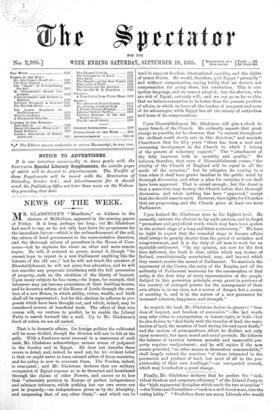Upon Disestablishment Mr. Gladstone will give a shock to many
friends of the Church. He evidently regards that great change as possible, for he observes that "a current throughout the civilised world slowly sets in this direction," and reminds Churchmen that for fifty years "there has been a vast and increasing development in the Church to which I belong of the powers of voluntary support." The "attachment of the laity improves both in quantity and quality." He believes, therefore, that even if Disestablishment comes, "the vitality of the Church of England will be equal to all the needs of the occasion ;" but he relegates its coming to a time when it shall have grown familiar to the public mind by thorough discussion, and when a plan for carrying it out shall have been approved. That is sound enough ; but the dread is that a mass-vote may destroy the Church before that thorough discussion, and when nothing has been "approved," except that she should cease to exist. However, time fights for Churches that are progressing, and the Church gains at least one more Parliament.


































